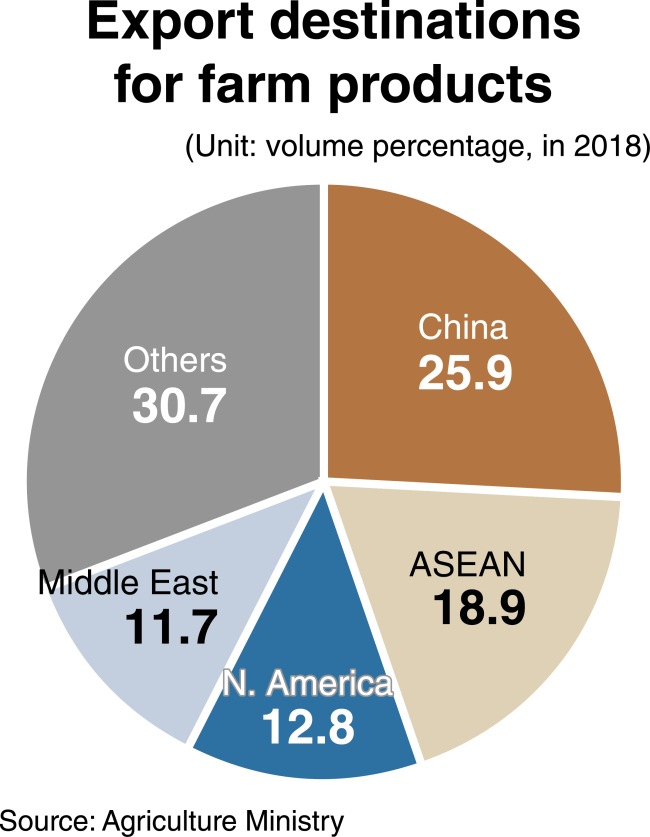SEJONG -- South Korea’s agro-fishery products are gaining popularity in China and Southeast Asia on the back of their reputation for quality, freshness and safety.
According to the Ministry of Oceans and Fisheries, exports of fishery products hit an all-time high of $2.386 billion in 2018, surpassing the former record of $2.383 billion set in 2012.
While the largest and second-largest export destinations for marine products were Japan with $760 million and China with $390 million, exports to Japan inched down 1.2 percent on-year whereas those to China increased 6.1 percent.
In the Chinese market, more expensive products gained popularity with abalone, sea cucumber and crab exports respectively increasing 3,133.1 percent, 299.6 percent and 215 percent from the previous year.
In Southeast Asia, fishery product exports to Vietnam climbed 29.4 percent to post $130 million. In particular, frozen tuna exports to the nation jumped 220.7 percent from $9.99 million in 2017 to $23.17 million in 2018.
 |
Officials from Korea and Vietnam cut tape at a shopping mall in Hanoi in September 2018 as part of a ceremony to promote Korean agricultural products. (North Chungcheong Provincial Office) |
A ministry official attributed the increase to the recent vitalization of Vietnam’s frozen-food processing industry.
Both the Fisheries Ministry and Korean producers have sought to diversify export destinations by developing technologies to maintain freshness in transit.
Exports of agricultural products also posted steady growth in 2018, having increased in value on-year by $100 million to record $6.93 billion, representing a third consecutive year of growth.
Though processed foods previously led exports of agricultural products, freshness-oriented products took the initiative last year, said the Ministry of Agriculture, Food and Rural Affairs. Noteworthy export items were fruit, vegetables and ginseng.
Exports of the fresh products, which had been sluggish for the past five years, reached a record of $1.28 billion in 2018, up 16.6 percent from a year earlier.
Grape exports to China posted $14.3 million, an increase of 61.3 percent, and pear exports to destinations such as Vietnam and the US grew 21.3 percent to post a combined $80 million.
Poultry exports, which had plunged 58.7 percent in the aftermath of avian influenza outbreaks in 2017, shot up 183.7 percent in 2018 to record $47.6 million. “Chicken exports to the Vietnamese market resumed, buoyed by close coordination between the government and the private sector,” said the Agriculture Ministry.
In addition, Korea’s exports of tomatoes, ginseng and strawberries rose 20.5 percent, 18.5 percent and 9.2 percent, respectively. Strawberries were popular in Malaysia and Vietnam, while demand for tomatoes grew in Japan.
Among processed products, exports of farm-based beverages posted 20.6 percent and dairy exports posted 22 percent.
 |
(Korea Herald) |
China accounted for the largest proportion of total agricultural exports with 25.9 percent ($1.79 billion), followed by the Association of Southeast Asian Nations bloc with 18.9 percent ($1.3 billion), North America with 12.8 percent ($889 million) and the Middle East with 11.7 percent ($813 million).
A ministry director general based at Government Complex Sejong said fruit grown in Korea was a popular gift item in Vietnam. After Park Hang-seo, the head coach of the Vietnamese national soccer team, became the honorary ambassador for Korean farm products in February 2018, orders for cup tteokbokki (stir-fried rice cakes) soared to $10 million, the official pointed out.
The official also predicted that brisk exports to China would continue, saying Korea would enjoy most favored nation status under the bilateral Free Trade Agreement starting this month.
For citron (yuja) tea, tariffs will be slashed from 18.7 percent to 12 percent, according to the Agriculture Ministry.
The Korea-China FTA took effect in 2015. FTAs with the 10 ASEAN members took effect between 2007 and 2010.
By Kim Yon-se (
kys@heraldcorp.com)









